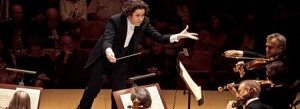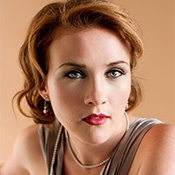On Sunday afternoon, Gustavo Dudamel conducted the LA Phil in the last concert of his Schubert/Mahler series by performing Schubert’s Symphonies No. 8 in B minor, D. 759 (“Unfinished”) and No. 9 in C major, D. 944 (“Great”), and songs from Des Knaben Wunderhorn by Mahler.
Dudamel opened the concert with a powerful performance of Schubert’s Symphony No. 8. This piece is one of the most often played in the repertoire and as such, it is easy to take it for granted. But Dudamel forced the audience to really listen to it by emphasizing the juxtaposition of the quieter, more melodic sections with the more urgent sections. The symphony begins with the cellos and basses playing the opening theme in unison before being taken up by the violin tremolos, all of which sets the backdrop for the theme played by the clarinets and oboes, which Schubert then transforms throughout the first movement. Even though the tempo markings in the two movements are different, because of how Schubert scored the symphony, they don’t sound that different. For example, even though the first movement is marked allegro moderato (moderately fast), because the melodic lines are so broad and sweeping, one doesn’t get the feel of an allegro. And because the second movement is marked andante con moto (slowly with motion), the motion makes it seem not so slow. All in all, Dudamel gave the audience a whole new perspective on this popular work — it was revelatory.
The first half concluded with songs from Des Knaben Wunderhorn (“The Youth’s Magic Horn”), a collection of anonymous German folk poems that influenced numerous German composers, including Mendelssohn, Schumann and Brahms. But it is Mahler’s songs that are the most well- known. For Sunday’s concert, Dudamel and the Phil performed four of the songs with mezzo-soprano Sasha Cooke. As with his other song cycles, Mahler chose orchestral accompaniments that were minimal with interesting collaborations between individual instruments from different sections of the orchestra. Cooke’s voice was delicate yet strong and as with the previous Mahler song cycles performed by Dudamel and the Phil gave Mahler’s songs the atmosphere they deserved, from the more lighthearted “Rheinlegendchen” to the tragic “Das irdische Leben” (The Earthly Life), in which a starving child dies just as his mother bakes some bread to feed him, which, like the Kindertotenlieder, is difficult to hear for those with small children.
The concert concluded with a performance of Schubert’s last symphony, the so-called “Great C- major,” to distinguish it from the Sixth, also in C major. While it could be said that the Eighth contributed to ushering in the Romantic movement, the Ninth cemented that claim. It is sweeping in its scope and length. In fact, it paved the way in length and structure for the symphonies of another Austrian composer, Anton Bruckner. Whereas the Eighth symphony in its key of B minor is more tragic, the Ninth is uplifting. And it not only uplifted the audience, but it seems to have had that effect on Dudamel, who for the past few weeks has been noticeably distressed by the political events in his home country of Venezuela. Especially in the scherzo, Dudamel was dancing and smiling, and even when he walked offstage at the end, he managed a smile for the orchestra east patrons.
It was interesting to compare Dudamel and the LA Phil’s Ninth with that of Jeffrey Kahane and LACO who performed it the night before at the Alex Theatre in Glendale for Kahane’s last concert as LACO’s music director (see Culture Spot LA’s review). Both versions were exciting, as Schubert obviously intended, and both orchestras played extremely well. Dudamel and the Phil had the added benefit of performing with the acoustics of Walt Disney Concert Hall. No matter. These were two great ensembles with two outstanding conductors performing a “Great” symphony — and both in LA!
—Henry Schlinger, Culture Spot LA







